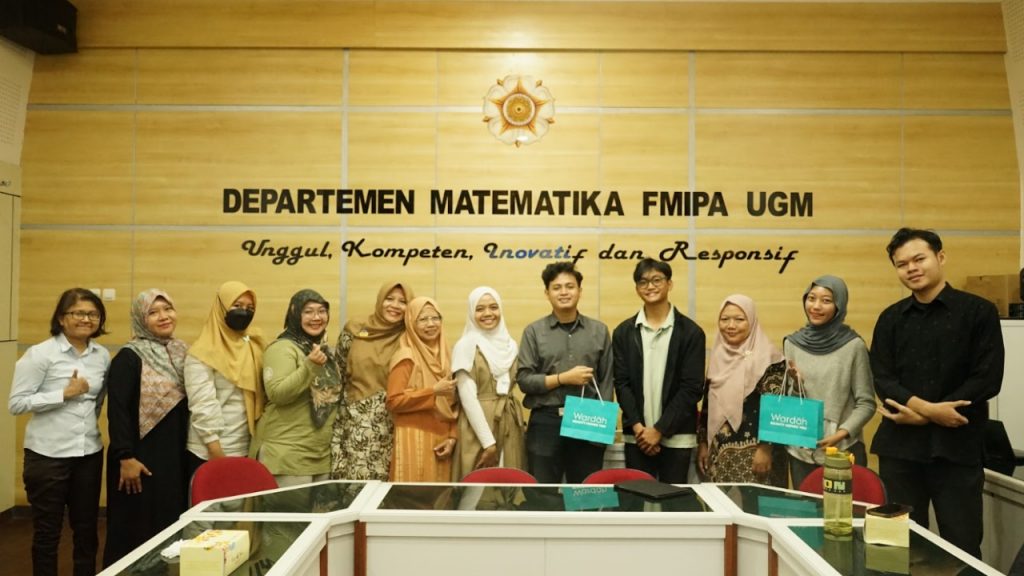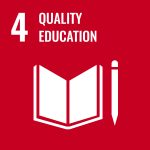 Demomatika Series 10 was held on July 7, 2025, in Room 1 on the 3rd floor of the Department of Mathematics, both online and offline. The event began with opening remarks from the Secretary of the Mathematics Department at FMIPA UGM, Dr. Noorma Yulia Megawati, S.Si., M.Sc., followed by the first session moderated by Dr. Solikhatun, M.Si. The first presenter, Khoirunnisa’ Rizky Noor Fatimah, S.Si., from the Apple Developer Academy, delivered a presentation titled “How Math Took Me Into Machine Learning: A Journey from Pure Math to the Real World of Machine Learning, Mentoring, and Multimodal Models.” She shared how her background in pure mathematics led her into the world of machine learning, as well as the importance of concepts such as linear algebra and calculus in model development.
Demomatika Series 10 was held on July 7, 2025, in Room 1 on the 3rd floor of the Department of Mathematics, both online and offline. The event began with opening remarks from the Secretary of the Mathematics Department at FMIPA UGM, Dr. Noorma Yulia Megawati, S.Si., M.Sc., followed by the first session moderated by Dr. Solikhatun, M.Si. The first presenter, Khoirunnisa’ Rizky Noor Fatimah, S.Si., from the Apple Developer Academy, delivered a presentation titled “How Math Took Me Into Machine Learning: A Journey from Pure Math to the Real World of Machine Learning, Mentoring, and Multimodal Models.” She shared how her background in pure mathematics led her into the world of machine learning, as well as the importance of concepts such as linear algebra and calculus in model development.
Khoirunnisa explained that currently, the process of developing machine learning models is becoming easier through a plug-and-play approach using libraries such as Apple’s CoreML. She shared her experience in building machine learning-based applications, such as Giroah, a voice recognition application for reading the Qur’an, and a computer vision application to assist with archery posture. Currently, she is developing a multimodal deep learning model that combines voice recognition and mouth movement as part of her thesis research.
According to her, direct experience is very important in building machine learning models, especially in the data calibration process so that the model can recognize objects accurately. She emphasized that models are never 100% accurate, so a deep understanding of mathematics is crucial.
Currently, Khoirunnisa is developing a multimodal deep learning model that combines voice and mouth movement recognition for her thesis research. She stresses the importance of hands-on experience in the data calibration process and introduces the concept of a “math mindset advantage,” which encompasses logical thinking, proof strategies, and abstraction skills. This mindset serves as a crucial foundation for simplifying real-world problems into forms that can be processed by machines.
The second session continued with moderator Grandianus Seda Mada, M.Sc., who guided the presentation of the second speaker, Vemmie Nastiti Lestari, S.Si., M.Sc., a lecturer at Gadjah Mada University. Vemmie presented her research results in a presentation titled “Robust Time Series Clustering of GARCH (1,1) Models with Outliers.”
In her presentation, Vemmie explained how the M-estimation method proved to be more robust than Quasi-Maximum Likelihood Estimation (QMLE) in the clustering process of GARCH (1,1) models containing outliers, such as Additive Level Outliers (ALO) and Additive Volatility Outliers (AVO). Using Hierarchical and K-means clustering algorithms, this study compared the clustering results based on the estimated parameters from both methods.
The results show that clustering with M-estimation produces better grouping, as indicated by a smaller C-index value, both in simulated data and in case studies of stock data from the Indonesia Stock Exchange. This research represents a step forward in the development of robust methods for analyzing financial time series data that are prone to outliers.
Both sessions concluded with an active and enthusiastic question-and-answer session. Participants took advantage of this opportunity to delve deeper into the experiences and knowledge of the presenters, making the discussion lively and interactive.
 Keywords: Demomatika, Machine Learning, Time Series
Keywords: Demomatika, Machine Learning, Time Series
Author: Priscilla Deviana Tachija
Photo: Fathan Rasyid Rahmadhan
